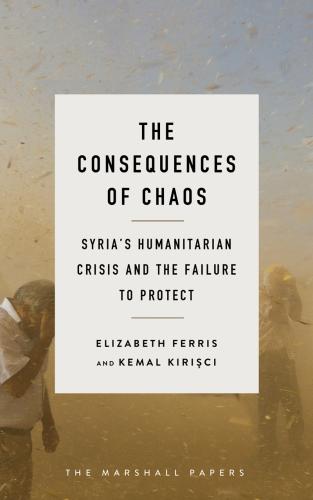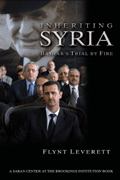In week 12 of Donald Trump’s presidency, the president met with NATO’s secretary-general, the secretary of state met with Russian leaders, tensions about North Korea increased, and talk of reviving the stalled health care replacement bill resurfaced.
Here’s an update on what Brookings experts are saying in the first 100 days about the Trump administration’s policy choices, personnel decisions, and engagements with global and domestic events. To receive daily updates on new Brookings research, commentary, and events, subscribe to our newsletters.
On Monday April 24, Brookings hosts a half-day forum to look back on the first 100 days of the Trump presidency and look ahead to the future.
Read what Brookings experts had to say about the First 100 Days in: Week Eleven | Week Ten | Week Nine | Week Eight | Week Seven | Week Six | Week Five | Week Four | Week Three | Week Two | Week One.
ON DOMESTIC & ECONOMIC POLICY
William Galston discusses a recent Quinnipiac poll on American voters and says that “President Trump would be well-advised to shift his focus back toward the kinds of core economic issues—such as rebuilding America—that got him elected in the first place.”
Andrew Feldman and Robert Shea argue that the new White House Office of American Innovation helmed by Jared Kushner, despite being received with understandable skepticism, “has terrific potential to inject a much-needed dose of modernity into government.”
David Wessel comments on the Trump administration’s and Congress’s plans for tax overhaul.
Experts from the The Leonard D. Schaeffer Initiative for Innovation in Health Policy examine how the Trump administration should handle Medicare’s new bundled payment programs.
MORE ON SYRIA
Bessma Momani says the U.S. missile strike against Syria is both a geopolitical victory and a potential slide into “a new war Americans didn’t ask for.” But, she adds, “Donald Trump’s strike on Syria is a game changer in this protracted Mideast conflict. Whether it ushers in an end to Mr. al-Assad’s brutality or incites the beginning of a global and regional conflict is yet to be seen.”
Shadi Hamid offers this “practical guide for navigating the key sticking points in this latest iteration of the Syria debate.”
Thomas Wright writes that it “is hardly surprising that Trump likes the idea of a once off strike that deters a mass atrocity. It is quite another to invest resources and political capital into an internationalist foreign policy.”
ON FOREIGN & NATIONAL SECURITY POLICY
Bathsheba Crocker examines what is at risk with President Trump’s proposed cuts to funding for UN and affiliated agencies, “and what the United States might stand to gain from holding firm as a committed partner on the world stage while conducting a clear-eyed and honest review of U.N. funding.”
Steven Pifer says “it is a bit surprising” that Secretary of State would ask, as reported, why U.S. taxpayers should be interested in Ukraine. Pifer provides the reasons.
Michael O’Hanlon argues that President Trump should try to de-escalate tensions with Russia by pursuing a “broad agreement” with Moscow, NATO states, and neutral countries of Europe such that NATO would not expand further and in return “Russia would commit to leave the neutral countries alone, withdraw military forces from their territories, allow them to join whatever diplomatic and economic groups they want.”
Aslı Aydıntaşbaş and Kemal Kirişci explore factors in the “strained” relationship between the U.S. and Turkey, and offer strategies “to reboot ties in a period of uncertainty and chaos across the Middle East.”
Mireya Solís responds to questions about Trump’s economic policies and U.S.-Japan trade, saying that “it’s too soon to feel relief that Trump will hold back on some of his hardcore nationalist campaign pledges.”
David Dollar looks back on the recent Trump-Xi summit, noting that “Trump is likely to find that working for China’s support on Syria, North Korea and the next unexpected security crisis takes up most of the relationship and makes it unlikely that the administration would really crack down on China in the trade realm.”
—
For more details policy recommendations and analyses from Brookings experts for the new administration, see “Brookings Big Ideas for America” on issues including the threatened middle-class dream in America, health care, criminal justice reform, infrastructure, U.S. alliances, nuclear weapons, terrorism, and regional conflicts.




Commentary
President Trump’s First 100 Days: What Brookings experts are saying, 4/14/17
April 14, 2017